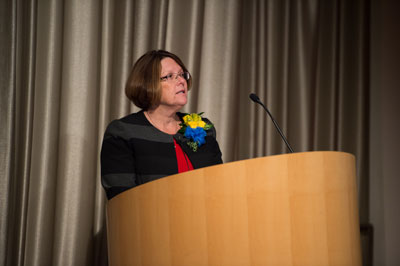New UMSN Center to Focus on Complexity and Self-Management of Chronic Diseases
"When people have chronic diseases, there is complexity; one pill alone isn’t going to help."
“Human beings do not live in isolation either physiologically or psychosocially,” says University of Michigan School of Nursing (UMSN) Professor Debra L. Barton, RN, PhD, AOCN, FAAN, UMSN’s Mary Lou Willard French Professor of Nursing. “Examining one little piece may work in some instances--but when you are talking about people, it can be a waste of time of time because you are not taking it in context with everything else.”
 Obesity, cancer, heart disease, allergies, Alzheimer’s, and diabetes are just a few of the numerous chronic diseases that will be the target of a newly established center focused on Complexity and Self-management of Chronic Disease (CSCD) and funded by a $1.4 million grant from the National Institutes of Health (NIH) and National Institute for Nursing Research (NINR). Dr. Barton and UMSN Associate Professor Ivo Dinov, PhD, will serve as co-primary investigators.
Obesity, cancer, heart disease, allergies, Alzheimer’s, and diabetes are just a few of the numerous chronic diseases that will be the target of a newly established center focused on Complexity and Self-management of Chronic Disease (CSCD) and funded by a $1.4 million grant from the National Institutes of Health (NIH) and National Institute for Nursing Research (NINR). Dr. Barton and UMSN Associate Professor Ivo Dinov, PhD, will serve as co-primary investigators.“A very strong tenet of nursing science is self-management, both in terms of preventing disease and living well with chronic disease,” says Dr. Barton. “We can look at process issues at the systems level, health care delivery, and we can leverage big data to understand complex systems. We have a comprehensive variety of expertise that fits under this umbrella of health and wellness.”
The NINR supports nine centers across the country. Each one is focused on a common theme and is designed to improve capabilities of emerging programs of research, with the expectation of developing larger scale research projects.
Annually, U-M's CSCD will award $25,000 to interdisciplinary pilot projects for the duration of the five-year grant and will  serve as a campus-wide resource and area of collaboration to increase research output and integrate advanced scientific methods. “The funding provides an infrastructure that can help produce pilot data and quality investigators in order to get additional funding for very important programs of research,” says Dr. Barton. “We have an external advisory board with members from different disciplines across and outside the university to help build our team approach.”
serve as a campus-wide resource and area of collaboration to increase research output and integrate advanced scientific methods. “The funding provides an infrastructure that can help produce pilot data and quality investigators in order to get additional funding for very important programs of research,” says Dr. Barton. “We have an external advisory board with members from different disciplines across and outside the university to help build our team approach.”
 serve as a campus-wide resource and area of collaboration to increase research output and integrate advanced scientific methods. “The funding provides an infrastructure that can help produce pilot data and quality investigators in order to get additional funding for very important programs of research,” says Dr. Barton. “We have an external advisory board with members from different disciplines across and outside the university to help build our team approach.”
serve as a campus-wide resource and area of collaboration to increase research output and integrate advanced scientific methods. “The funding provides an infrastructure that can help produce pilot data and quality investigators in order to get additional funding for very important programs of research,” says Dr. Barton. “We have an external advisory board with members from different disciplines across and outside the university to help build our team approach.”“The CSCD center is unique as it engages multidisciplinary complexity-study investigators working on research methods, computational analytics, and their direct health care applications for self-management of chronic illness,” says Dr. Dinov. “The CSCD provides clinical, bio-social and statistical expertise, computational resources, study-design consulting, and training opportunities.”
“I think that Dr. Dinov’s expertise in complex methods analysis design is something that nursing in general is very much in need of,” says Dr. Barton. “Having the methods to do that in a rigorous way is not inherent expertise in nursing so I think Dr. Dinov’s contribution is critical to our success.”
Dr. Barton says they are also looking for ways to involve students. “Students will be able to participate in our seminars and think tanks, but they can also be part of the teams that are requesting resources from the center,” she says. “We will be modeling team science and that’s important for students to see.”
Research in this release is supported by the NIH/NINR under grant number P20 NR015331. The content is solely the responsibility of the authors and does not necessarily represent the official views of the NIH/NINR.
Media Contact:
Mary Beth Lewis, University of Michigan School of Nursing
sn-comm@umich.edu, (734) 763-1682





